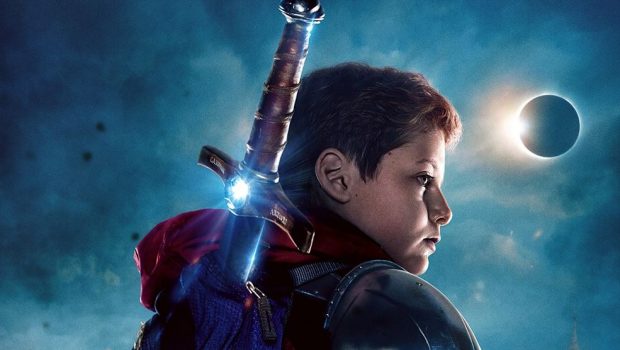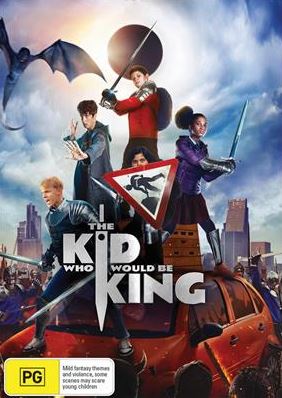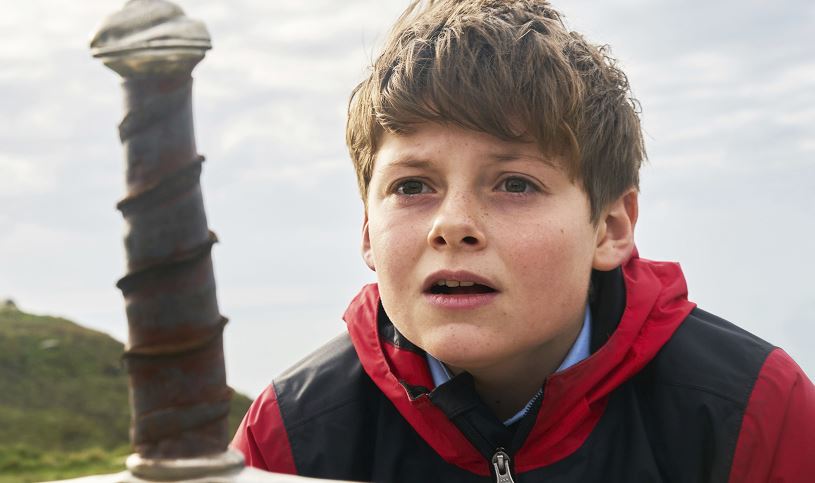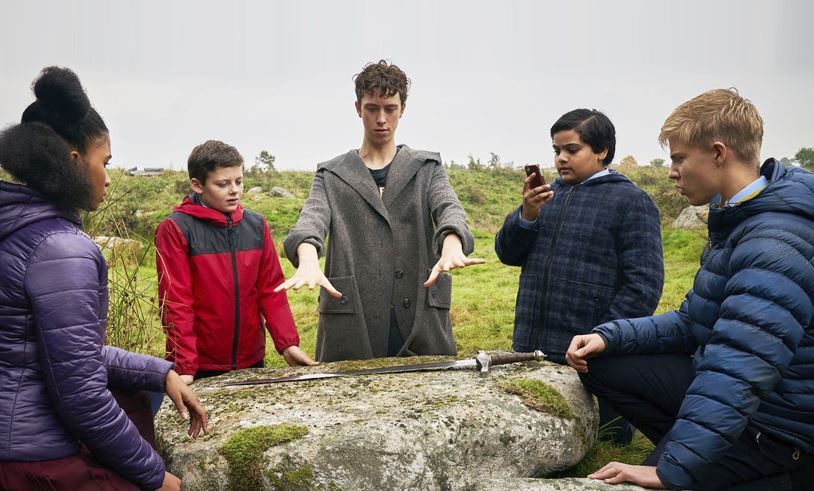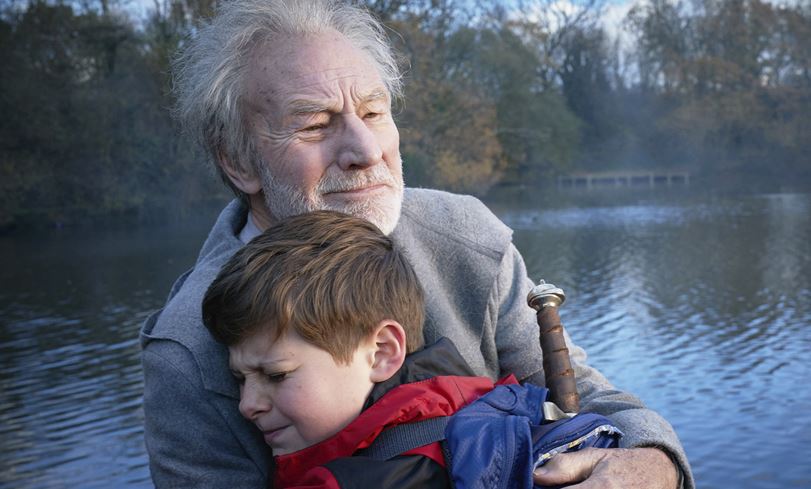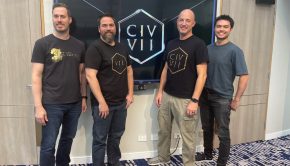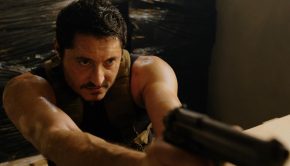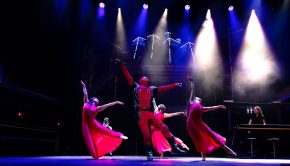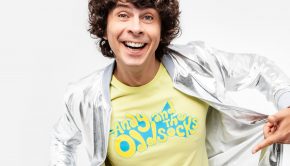THE KID WHO WOULD BE KING: Q+A with Joe Cornish
Joe Cornish made his name on TV with long-time comedy partner Adam Buxton who formed the comedy duo Adam and Joe. In 2011, he released his directorial debut Attack the Block, which he also wrote. He co-wrote The Adventures of Tintin: Secret of the Unicorn, with Steven Moffat and Edgar Wright, and Ant-Man, with Wright, Adam McKay and Paul Rudd. The Kid Who Would Be King is a modern-day King Arthur adaptation, which he wrote and directed…
This has been a life-long journey for you it seems…
It did take a long time because I had the idea when I was 12 or 13, the idea of a modern kid finding a sword in a stone. I am 23 now so it took ten years (laughs)! No, I’m 50 so it took a very long time but during that period I was lucky enough to do a lot of TV and then work with Edgar Wright who taught me a lot about screenwriting. So this is a combination of childhood fantasies and, hopefully, a bit of adult experience in the industry and maybe a greater ability to screen write than I had when I was 12 years old.
You have a background in comedy so when you started the screenplay for this did you start with the comedic ideas?
It is all sort of bundled up together. I started with the idea of juxtaposing Arthurian myth with modern life. When I was a kid I thought of the idea of him finding the sword and I thought of the sword coming out of the bathtub. I thought that was a cool contrast. And I lived behind a big glass school and always liked the idea of a siege and the kids defending the school. So I had those three or four ideas and then the rest of it was a question of my knowledge of Arthurian movies, really. I don’t read much Arthurian stuff because it is quite hard work but I see hundreds of movies so then it was thinking about the fun contrasts and juxtapositions. It’s nice to have an existing story to use as a springboard. But I definitely think trying to make it funny, and not taking itself too seriously is part of my instinct as a comedian.
Other than Excalibur what are the great Arthurian film retellings you’ve enjoyed?
Monty Python and The Holy Grail is probably on a par with Excalibur! There’s the Clive Owen one, isn’t there? And Army of Darkness I like a lot. That is not really Arthurian but it is a lovely mediaeval juxtaposition of the modern guy and going back in time. Then we recently had the Guy Ritchie one.
Did you read any of the books at all? I know the medieval versions are quite hard work and dense.
I read Le Morte d’Arthur by Malory but it is tough going so I went on Amazon and bought lots of children’s books, versions of it for kids because it is a complicated myth. It is long. It lasts his entire life and there are all sorts of subplots and side adventures with all the different knights. Some of the quests do not make too much sense. It’s a very ancient myth but it has in it these five or six amazing narrative devices — whether it’s the Round Table or Camelot or the sword in the stone or the Lady of the Lake or Merlin, all these eternal ideas which have lasted over the centuries which kids actually know even if they don’t know the details of the mythology. Most people know those five or six basic elements.
Were there any other elements of your story that have percolated in your mind for a long time?
The bully thing is from personal experience. I was a little bit bullied like most people were. I did a big research trip and went to Cornwall, Tintagel and Bodmin Moor and visited all those Arthurian sites to make the journey authentic. I think those are the specific things, probably.
Why has it taken you so long to come back to directing? You have had writing jobs in between…
I think it was more a question of waiting for the right idea. After I’d made Attack the Block I was offered a lot of big Hollywood movies but I was nervous about doing something too big because sometimes that works well for directors and at other times it can be a problem. People get fired and they get replaced, pushed aside. Sometimes they make a movie that they don’t feel is theirs and after Attack the Block I immediately went to work on Ant-Man, which Edgar Wright and I worked on until 2014. It came out in 2015 and Edgar had hired me for Ant-Man long before I did any work on Tintin and before Attack the Block so I felt very loyal to him and thought that I should be with him and see that process through. So while I did that I promoted Attack the Block and I wrote a screenplay based on a book called Snow Crash. Then I started writing this in 2015 and then got attached to a project called Section Six for Universal. I worked on that for a year but like many projects in Hollywood it didn’t quite get there. Then I started writing on this again in 2016. We got the finance in 2017 and we shot it in 2017 and 2018. We released it in 2019. So it seems like a long time but I have been working non-stop and I am in a way pleased that I didn’t do something that wasn’t mine. And, hopefully, I learned a lot just by observing and experiencing during that period. I think to be able to make a film that is authored on this scale for a studio that is not a pre-existing property, that isn’t an adaptation of a famous comic book, or isn’t a remake, is quite rare. So next time I would like to do it faster but I felt ready and I felt equipped to do a good job after my years of observing.
When did you incorporate the idea that Britain was a lost and leaderless place?
That is in the myth, of course. Arthur came to prominence in a time when Britain was divided and there was no king. There were multiple claimants and different territories were fighting with each other. It is just coincidence that this movie has been made at a time when, weirdly, that seems to be the case again. For the first time in centuries Britain is threatened with break up and weirdly all these ancient evils that we thought were part of history, that were asleep under the soil, seem to have woken up — whether it is nationalism or xenophobia. It is a coincidence although, saying that, four months after I made Attack the Block there were massive riots in London as well because the youth had had enough. So it was weird; both times the movies seemed to have coincided with things happening in the country that to one degree or another reflect what the film is about.
So, we need a new Arthur right now?It would be good, wouldn’t it, for Britain. One of the things that I wanted to take from the mediaeval world was the chivalric code, these very basic rules that noble knights lived by, and they are not particularly ambitious things. They are things like: honour those you love, speak the truth at all times, refrain from wanton offence and persevere until the end. They seem like quite simple things but actually if you applied them even to some of the politicians in the world it would be a good thing. That in a way is kind of shocking because it shouldn’t feel like a particularly different or radical message. Sometimes I think that the adults in charge in the world could do with obeying some kind of code of decency. But, overall, this is an entertainment and it is a big fun movie and one that, hopefully, has a positive influence on young children to whom it is aimed at. It works really well from 7- to 14-year-olds and then hopefully as well for mums and dads and movie lovers. There’s so much entertainment out there that is just interested in taking your money. I think it is nice to contribute something positive at the same time.
How difficult was the casting?
The kids are lovely, aren’t they? You are limited to the kids in the country of that age. The casting director saw thousands of kids and the very best came to me. The hardest one was Alex. We got the other three and Merlin quite quickly. Angus [Imre] was a miracle. He walked in wearing a school uniform, stood up on the table and made that speech and I was like, ‘Phew! Hilarious. Good. Quick! Cast him!’ Dean [Chaumoo] had never done anything before but he just looked exactly like I imagined Bedders. He was so sweet. He’s better than anything that Pixar designed. He is so cute. Tom [Taylor] was a very different kind of a bully, quite awkward and goofy and handsome but kind of clumsy. Getting Louis [Ashbourne Serkis] as Alex was the tough one. We had quite a few candidates but nobody was quite right and then he came in very late in the day and he was just brilliant. He did a scene with Dean and was just incredibly detailed and really in the moment, as they say. It is always hard work but, again, we had such a good experience on Attack the Block, finding those kids and the success of John [Boyega] has been great, so any opportunity to give young actors a launch pad is something I think is worth doing.
What do you think might make your film stand out?
First of all it is probably the original blockbuster. It is one of the oldest cultural myths there is. Star Wars has elements of it. Harry Potter has elements of it. All those ’80s fantasy adventures have elements of it. It has existed culturally all over the world and even if you don’t know precisely what it is, elements from that storytelling percolate. You read Joseph Campbell’s work and all that work he did on the mono-myth, a lot of it is there in Arthurian legend. Culturally, reflections of it have existed all over the world for probably most of the 20th century in popular culture and then in literature and poetry for even longer. Then, practically speaking, we did a bunch of research with kids in this country. We went round to lots of schools and we asked them what they knew about the Arthurian myth and they didn’t know a lot but they had heard of the Round Table. They knew about the sword in the stone. They knew if you pulled it out you got power. That was enough for us because the characters in the movie don’t know much about mythology. The boy has the book. You don’t need to know a lot about mythology to enjoy the movie. There’s animation at the beginning that tells you the basic story and then you are on the journey with the kids. You are learning with the kids because it’s 20 per cent a King Arthur movie and 80 per cent a modern action adventure movie.
Was it a difficult piece of direction with all of those kids during the siege?
The toughest thing is when you have a big crowd of kids. It was 100 or so in a big, wide shot and you know that they are going to be on a big screen and you know if one of them looks at the camera or pulls a face the whole shot is screwed. So you have to watch the monitor very closely and I’d get a megaphone and I’d say, ‘Listen, guys, your faces are going to be on a giant screen. One day you will be in an old people’s home and you will be 80 years old and you will flick through your hover screen or whatever it is, so don’t embarrass yourself in the future. Everybody counts.’ Hopefully, and I have watched the film pretty carefully, in all of those wide shots everybody is in the scene.
Were the kids in the big scenes just normal kids?
It was a combination of kids from that school where we filmed and then a lot of the kids who auditioned but didn’t quite get there and yet really wanted to be involved in the film. We brought them in as featured extras. So a lot of kids whose faces recur but who don’t speak were people who really impressed us in the audition process.
There are many more untapped elements in Arthurian myth so would you ever want to return to this story?
Yes, sure. I have a bunch of ideas. I think that it is important that the film stands on its own so it doesn’t have post credit scenes or a question mark. Even the way the kids have grown since we filmed them means you could introduce a generation of younger knights. There is lots of stuff to be done.
What made you decide when to use special effects and when to use in-camera effects?
I try and do as much physical stuff as possible because, especially when you are working with kids, they need something real to interact with. And on my first film, Attack the Block, it was all practical stuff; we had guys in suits playing the monsters. On this one a lot of the villains are digital but we made sure we always had a person there for the kids to fight with. When we had horses we made sure we had real horses. It just makes it more real. I love real locations and I love real physical contact. I think you lose something when stuff is done on green screen or is done with a tennis ball,. It was great to take the actors to Cornwall, take them to real locations and also to bash them with sticks and make them really feel what a battle was like.
Why did you decide to have Merlin cast his spells in that way?
I knew that I had to think of a different way of doing magic because everyone has seen wands, everybody’s seen the Harry PotterLatin kind of spells, and I had the idea to do something very rhythmic and physical. Then it was actually a bunch of ideas that I had when I was writing Snow Crash about coding in virtual reality where, if you are in a virtual space, the position of your limbs can actually mean something, mathematically. You can actually code in virtual space by using your hands. So I took that idea and thought, ‘Well what if he actually types on his fingers and that means something? Different knuckles might mean different things,’ so we combined all that. We then worked with a fantastic woman called Jennifer White who does stuff for Black Widow and Scarlet Witch [on The Avengers] and me and her and Angus figured out that language of hand magic.
Check out this exclusive behind the scenes feature to celebrate the release of the KID WHO WOULD be KING

